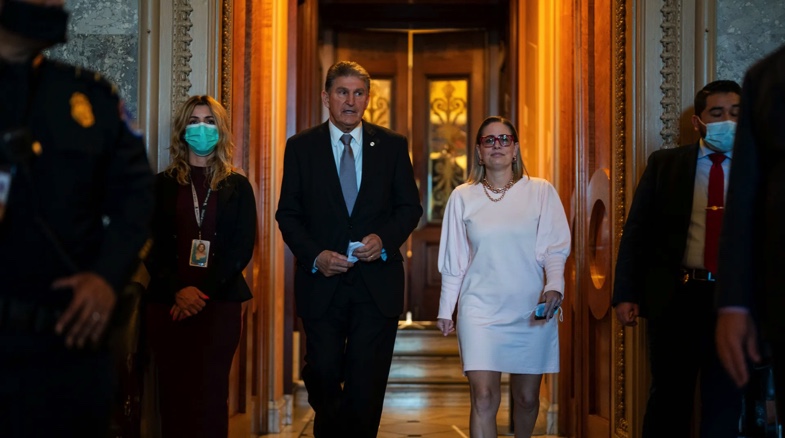It’s been a tough start to 2023 for moderates hoping for a return to normalcy in our politics.
The big picture: For all the talk of a No Labels third-party effort, the reality is that politicians —and by extension, many of their constituents — are still in a no-compromise mood.
- Donald Trump is barreling his way to the Republican nomination, gaining more momentum by the day. President Biden, who has made some moves to the center, hasn’t won over many swing voters for his efforts.
- Moderating forces in the Senate like Sens. Joe Manchin (D-W.Va.) and Kyrsten Sinema (I-Ariz.) are facing long odds returning after 2024, despite their bipartisan appeal.
- A partisan gerrymander is now likely in North Carolina (after a new state Supreme Court ruling), jeopardizing the prospects of some of the most-moderate Democratic lawmakers in the House.
- If Trump is at the top of the ticket, the 18 House Republicans in districts Biden carried will face existential danger. One House GOP strategist told Axios another Trump nomination would shrink the battleground map and limit the party’s appeal in the suburbs.
Why it matters: Swing voters make up the difference in competitive elections, but the bases of both parties are still gravitating to the extremes.
- Meanwhile, the moderates who have defied their party’s bases to seek compromise aren’t getting rewarded politically for their efforts.
Go deeper: Sinema and Manchin, who have been at the center of congressional dealmaking during Biden’s presidency, are underdogs. Neither has even committed to running for re-election.
- A new poll from the GOP firm co/efficient found Manchin is trailing Gov. Jim Justice by 14 points, 43%-29%. Manchin’s support of Biden’s pared-backed Inflation Reduction Act — which he now says he regrets and wants to repeal — has fueled his declining support back home.
- The press-shy Sinema has lately been doing a rare round of interviews in which she declined to answer political questions, including whether she plans to run for re-election in an interview with Jewish Insider.
- Despite being an incumbent in a state with a large number of independents, Sinema has consistently polled in third place in early public polling testing a three-way matchup against leading Republicans and Rep. Ruben Gallego (D-Ariz.).
Between the lines: Last week, the North Carolina Supreme Court paved the way for the GOP supermajority in the state legislature to ram through a partisan map to lock in a GOP advantage. The delegation now is evenly split, with seven Democrats and seven Republicans.
- North Carolina is home to some of the most moderate Democrats in Congress. Rep. Kathy Manning (D-N.C.) has called out progressives for being insufficiently supportive of Israel.
- Rep. Jeff Jackson (D-N.C.), a onetime Senate recruit, called out his colleagues on both sides of the aisle for engaging in “fake anger” for partisans. He’s been a leading voice for more bipartisan dealmaking.
- Rep. Don Davis (D-N.C.) ran as the moderate candidate in a contested primary last year, touting his ability to work with Republicans during the campaign.
- All three of these Democrats are at risk of losing their seats if a partisan GOP gerrymander succeeds.
The other side: Meanwhile, the 18 House Republican majority-makers — the representatives who won districts Biden carried in 2020 — are looking newly vulnerable with the growing likelihood of Trump as the 2024 nominee.
- Biden won five of the 18 GOP-held districts by double-digit margins. That alone is the margin of the House GOP majority.
- A liberal nonprofit group, Unrig Our Economy, is betting the GOP proposal to cut spending as part of a debt ceiling hike will be unpopular with swing voters.
- The group is airing over $1 million in ads targeting Biden-district freshman Reps. John Duarte (R-Calif.), Brandon Williams (R-N.Y.) and Marc Molinaro (R-N.Y.) for their support of the GOP debt ceiling legislation.
The bottom line: It’s very possible that we won’t be seeing many bipartisan dealmakers left in Washington after 2024.
- The one best check against the extremes: The growing possibility of continued divided control of Washington.
- Republicans have a strong shot at retaking the Senate with a historically favorable map (they just need to win one or two seats), while Democrats have a fighting chance to win back the House thanks to the GOP’s tenuous majority margin.



